| Author |
Message |
Gavin Kisebach

|
 Posted: Mon 19 Sep, 2005 7:00 pm Post subject: Macahuitl Aztec Sword Axe Club Posted: Mon 19 Sep, 2005 7:00 pm Post subject: Macahuitl Aztec Sword Axe Club |
 |
|
From time to time I run across descriptions of the Macahuitl, which sounds like a 2x4 with sharp obsidian lashed to its edges. I once read a description of a Spanish horse nearly beheaded by on of these.
Has anyone ever tried to make one of these? if so, how did you build it, and do you have any pics?  I'd love to see one in action, like the famous Falx vs soupcan Scutum pics. I know obsidian cuts like glass, but can be rather brittle. How would this effect plate armor? which would give first? Would this be the very definition of "blade presence"? I'd love to see one in action, like the famous Falx vs soupcan Scutum pics. I know obsidian cuts like glass, but can be rather brittle. How would this effect plate armor? which would give first? Would this be the very definition of "blade presence"? 
|
|
   |
 |
Jean Thibodeau

|
 Posted: Mon 19 Sep, 2005 7:34 pm Post subject: Posted: Mon 19 Sep, 2005 7:34 pm Post subject: |
 |
|
I think flint or obsidian has been used as scalpel blade for modern eye surgery, at least experimentally.
When looked at with a microscope the edges are as close to a zero edge as you can get and for surgery makes a very clean cut with no tearing. ( Down to a single molecule maybe ? )
If a small piece flakes off it can leave a new edge as sharp as the original edge in some cases.
At least this is what I vaguely remember from some long ago read science article.
Against steel plate or maille I would guess it would shatter ? Against leather or linen armour is should cut very aggressively.
Side note:
With the little leather working I've done I've noticed that a razor edge will cut as a hot knife through butter, but a less than razor sharp blade will have great difficulty cutting leather. Also leather being abrasive your razor edge won't be that way for long.
You can easily give up your freedom. You have to fight hard to get it back!
|
|
  |
 |
Gavin Kisebach

|
 Posted: Mon 19 Sep, 2005 7:47 pm Post subject: Posted: Mon 19 Sep, 2005 7:47 pm Post subject: |
 |
|
|
Agreed, the stone would shatter on good steel, although the concussion alone might still knock you galley west.
|
|
   |
 |
Jean Thibodeau

|
 Posted: Mon 19 Sep, 2005 7:57 pm Post subject: Posted: Mon 19 Sep, 2005 7:57 pm Post subject: |
 |
|
Gavin;
Yes and the obsedian is mounted on a substantial club that IS a decent mace all by itself.
If the club itself was not overly dammaged, new shards of obsedian could replace any missing or dulled pieces after any serious use !?
I think similar types of weapons were also made using shark teeth glued / attached to clubs in the South Pacific.
You can easily give up your freedom. You have to fight hard to get it back!
|
|
  |
 |
Gavin Kisebach

|
 Posted: Mon 19 Sep, 2005 8:01 pm Post subject: Posted: Mon 19 Sep, 2005 8:01 pm Post subject: |
 |
|
|
Does anyone have any pics? I know that shaping obsisian is done with a piece of antler, and is very time intensive. Examples I've seen are usually hand made spearheads and arrowheads, produced by Native American history enthusiasts, and can be rather expensive. If I knew where to get the stone, and had a good example, I might try it myself.
|
|
   |
 |
Gavin Kisebach

|
 Posted: Mon 19 Sep, 2005 8:24 pm Post subject: Posted: Mon 19 Sep, 2005 8:24 pm Post subject: |
 |
|
For anyone who has no idea what I'm talking about, I did manage to find these few pictures. Apparently Tom Anderson, who makes fantasy SLOs, makes a steel (and I use the word steel loosely) version of this. Cute, isn't it? The other pics are from the Florentine Codex, who's origin I am as yet unsure of.
 Attachment: 8.73 KB Attachment: 8.73 KB

Macahuitl - source unknown
 Attachment: 20.54 KB Attachment: 20.54 KB
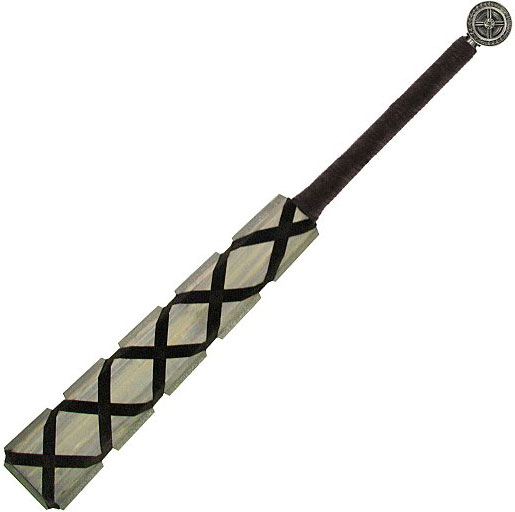
Tom Andersons fantasy version.
 Attachment: 21.31 KB Attachment: 21.31 KB
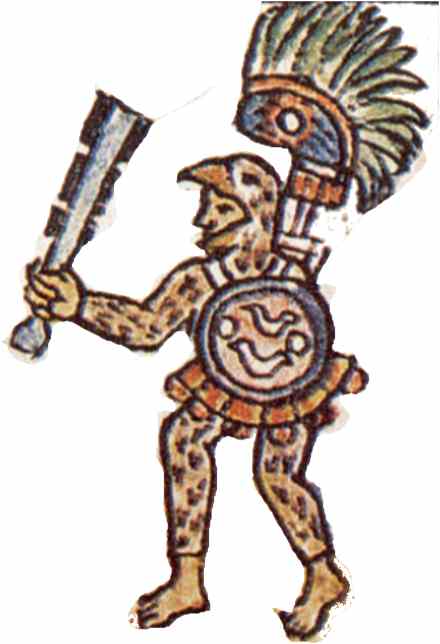
A frame from the Florentine codex
 Attachment: 30.68 KB Attachment: 30.68 KB
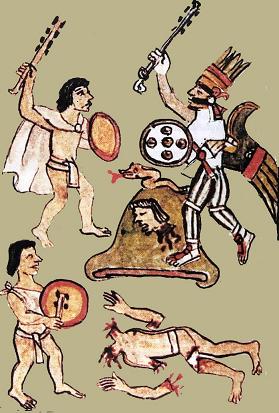
Source unknown.
|
|
   |
 |
|
Shane Allee
Industry Professional
Location: South Bend, IN Joined: 29 Aug 2003
Posts: 506
|
 Posted: Mon 19 Sep, 2005 9:13 pm Post subject: Posted: Mon 19 Sep, 2005 9:13 pm Post subject: |
 |
|
Hello Gavin,
Mark Grzybowski of http://www.ollinsworddesign.com/ and myself discussed these at great lengths around the shop when we were working together. He is very interested in most of the ancient central and south american cultures, so these are right up his alley. We never got around to making one of these though, all the further we got was trying to get a feel for working the obsidian. It is always hard to work on things like this when there is other work to be done, I'm sure he would love for someone to give him an excuse to make one of these if someone was to ever commission him to.
Obsidian is a natural glass though, so it is sharp, brittle, concoidal fractures, etc just like regular glass. It won't do well again any metals though. It will cut right through leather, recall a number of times it being picked up and used that very way just because it was right here and cut better than any knife in the shop. I've used it to cut tape, open boxes, and all kinds of other things that you would just grab a knife to use.
The thing about Macahuitl taking damage is that it will still be sharp, but it won't be as scary sharp as when it was made. It takes a bit to get it to flake right, so damage would most likely cause it to be more sharp and jagged. The type of cut you get would probably go from the cleanest cut you have ever seen to a cut with something like a chainsaw.
Rock shops are probably about the best place to buy obsidian, usually it is fairly cheap and sold by the pound. Sometimes pet/fish stores will carry it to put into fish tanks. http://www.nativewayonline.com/ sells it with their flint knapping supplies, probably similar types of places would as well.
Shane
|
|
    |
 |
Jean Thibodeau

|
 Posted: Mon 19 Sep, 2005 9:42 pm Post subject: Posted: Mon 19 Sep, 2005 9:42 pm Post subject: |
 |
|
Shane;
Because the obsidian is glued and / or attached with tongs to a piece of wood fairly thick compared to a steel sword using it with dismembering force / results might be difficult and a chop might be more likely to break off a piece: I wonder if draw cuts wouldn't be a preferred method to use these ? The extreme sharpness making deep cuts possible and draw cuts would spare the obsidian from stress that might flake off and damage the edge ?
The crosssection of the club might be very flat at least for a wooden club and possibly of diamond section with a deep groove on each side to hold the obsidian rectangles securely.
The edge being made of interrupted rectangular pieces is certainly due to the near impossibility of finding and making very long cutting edges and it should make replacing one damaged section a lot easier and attachment to the club.
A " Durable " semi-usable display piece might be made using some sort of tempered glass less likely to fracture or maybe some lexan tinted to look like obsidian ? I guess one could really cheat using blackened steel ground to imitate whatever facetting that obsidian would display. Just throwing ideas out there that might be taken as " Historical Heresy "   
You can easily give up your freedom. You have to fight hard to get it back!
|
|
  |
 |
Gavin Kisebach

|
 Posted: Mon 19 Sep, 2005 10:07 pm Post subject: Posted: Mon 19 Sep, 2005 10:07 pm Post subject: |
 |
|
| Quote: | | I guess one could really cheat using blackened steel ground to imitate whatever facetting that obsidian would display. Just throwing ideas out there that might be taken as " Historical Heresy " |
I think if you were gonna produce more than one of these, you'd just have to "cheat" I think the blackened steel would still be a pretty cool option if you did it right. Imagine the horror of hand flaking eight obsidian axe heads, only to drop the think on your garage floor. Ouch. I wonder if you could mass produce black porcelain in a "flaked" motif? I'm assuming the loop "pommel" is designed to take a lanyard. Notice also the little hand axe in the bottom left corner.
This may be a good stating point for NWMA - New World Martial Arts.   How would you use one of these? The pics suggest an axe and targe style. I was picturing something MUCH larger, after the descriptions of decapitating a horse. How would you use one of these? The pics suggest an axe and targe style. I was picturing something MUCH larger, after the descriptions of decapitating a horse.
SHane, thanks for the input, I'm glad I'm not the only one looking into this. I'll check out those resources.
|
|
   |
 |
Jean Thibodeau

|
 Posted: Mon 19 Sep, 2005 10:35 pm Post subject: Posted: Mon 19 Sep, 2005 10:35 pm Post subject: |
 |
|
Oh. decapitating a horse: I forgot about that story ! So maybe chops would be effective after all in addition to truly scary draw cutting ability.
How about using the same ceramic that Boker uses to make ceramic blade folding knives: I think it's more fragile that steel but less brittle than glass ? Would also be able to take a super edge. And maybe extra blades could be supplied with it or offered later as replacements.
HMMMMMMMM ! An Aztec multiblade box cutter   
Oh, call me crazy ! But how about a zytel body and snap in blades. ( I'm rolling on the floor laughing right now, Coldsteel might just make one of these, and I would probably buy one ! Can't find an emoticon GOOFY enough  ) )
You can easily give up your freedom. You have to fight hard to get it back!
|
|
  |
 |
|
Danny Grigg
|
 Posted: Tue 20 Sep, 2005 2:04 am Post subject: Posted: Tue 20 Sep, 2005 2:04 am Post subject: |
 |
|
Does anyone know if the Macahuitl was used by the Mayans?
The reason I ask is because a few months ago I found a site that was selling a Macahuitl, however it was called a Mayan War Sword or War Club. It had a pic which was similar to the second pic posted by Gavin.
By the way thanks Gavin for posting this thread, as I had no idea what this weapon's correct name was until now.
I also found this on an encyclopedia site:
"The term macana, of Taíno origin, refers to a number of different wooden weapons used by the various native cultures of Central and South America.
The earliest meaning attributed to macana is a sword-like weapon made out of wood, but still sharp enough to be dangerous. The term is also sometimes applied to the similar Aztec weapon, which is studded with pieces of obsidian in order to create a blade, though some authorities distinguish this item by using the Nahuatl name macahuitl.
In modern Spanish the word has broadened to refer to various types of blunt wooden weapons, especially a police nightstick."
* The Taíno are the pre-colombian Amerindian inhabitants of the Greater Antilles, which includes Cuba, Hispaniola ( Haiti and the Dominican Republic), Puerto Rico, Jamaica and the Bahamas.
* The Aztecs were a Mesoamerican people of central Mexico in the 14th, 15th and 16th century.
* Nahuatl is a native language of central Mexico.
Lastly I found the attached pic on another website.
 Attachment: 41.3 KB Attachment: 41.3 KB
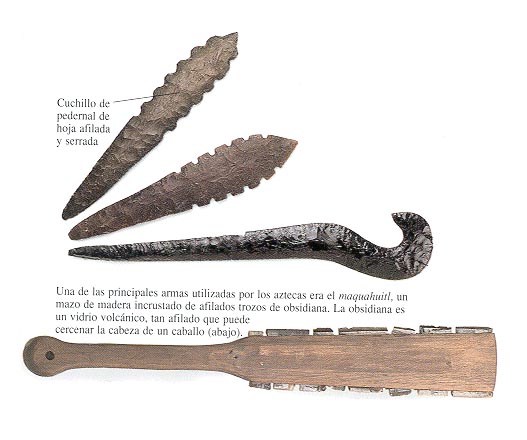
|
|
  |
 |
Gavin Kisebach

|
 Posted: Tue 20 Sep, 2005 2:28 am Post subject: Posted: Tue 20 Sep, 2005 2:28 am Post subject: |
 |
|
Wow great picture, Danny, thanks. that blade in the middle is amazing, the skill to work with such a difficult medium must take decades. Perhaps obsidian isn’t as brittle as I thought. I don’t think a craftsman would spend the time to make such an intricate blade if he knew it was just going to snap.
It doesn't look as thought the axe is lashed together, as I first thought, so I assume some sort of glue was used. I'm getting a better picture in my mind of how this beast should look. It doesn't look as heavy as I'd first pictured it. The same principles apply to all weapons, I suppose: if you can't strike first, you may not strike at all.
I'd really like to see some Aztec motif carved into a rich dark wood, that flat surface just cries out for a relief mural. Maybe Jake Powning or Vince Evans could come up with something. Anybody got a few grand just lying around?
|
|
   |
 |
|
Jeroen Zuiderwijk
Industry Professional
|
 Posted: Tue 20 Sep, 2005 3:27 am Post subject: Posted: Tue 20 Sep, 2005 3:27 am Post subject: |
 |
|
Probably interesting to mention, these type of weapons weren't only limited to America, but in Europe we've got these examples (found in Denmark):

I don't know if they were actually intended for combat or not. The curved sword is actually a direct copy of similar bronze swords found in Denmark (see example: http://membres.lycos.fr/bronzeage/early_and_m...160218.jpg) , that weren't intended for combat (non-sharpened edges). The same goes for the flint daggers, which are also copies of bronze ones.
|
|
   |
 |
Sean Flynt

|
 Posted: Tue 20 Sep, 2005 5:41 am Post subject: Posted: Tue 20 Sep, 2005 5:41 am Post subject: |
 |
|
Theoretically, creating long blades is easier than creating, say, a projectile point. Starting with a core of stone, you break off the top and hammer on the edge of that new surface down toward the base of the stone, working your way around the perimeter of the stone. This results in long blades of roughly pyramidal or triangular cross-section. You wouldn't need to do any more work on those blades. They could be mounted as-is on the club. Knapping is easier said than done, of course, but it rewards experimentation. WARNING: It's not cool to have tiny razor blades flying around your face while you're learning. Wear safety glasses. I would recommend gloves as well but I don't know if you can get the feel for the work through gloves. The good news is that the flakes are so sharp you don't feel the cuts. You just suddenly realize you're bleeding.
Find a good river cobble of white quartzite for your hammerstone. Finding good material for the blades is not as easy, unfortunately. Some folks suggest practicing on poporcelainrom an old broken toilet, but I didn't find that particularly rewarding.
Try looking up "flint knapping" online. Here's a site that provides a few drawings to help you visualize what's required:
http://museums.ncl.ac.uk/flint/knap.html
For your purposes, you'd stop after the "taking off flakes" step. They show a slightly more sophisticated method using a hammer and antler tine (as opposed to just a hammerstone). Experiment, because no amount of words can prepare you for the reality. It's too subtle.
-Sean
Author of the Little Hammer novel
https://www.amazon.com/Little-Hammer-Sean-Flynt/dp/B08XN7HZ82/ref=sr_1_1?dchild=1&keywords=little+hammer+book&qid=1627482034&sr=8-1
|
|
   |
 |
|
J. Padgett
Location: In a comfy chair Joined: 17 Nov 2003
Posts: 137
|
 Posted: Tue 20 Sep, 2005 7:25 am Post subject: Posted: Tue 20 Sep, 2005 7:25 am Post subject: |
 |
|
This weapon seems analogous to the shark tooth lined clubs some Pacific island cultures had. To get and idea of the kinds of wounds, and techiniques possible you might look for accounts of that weapon.
"The truth shall make ye fret."
|
|
  |
 |
Gordon Frye

|
 Posted: Tue 20 Sep, 2005 8:01 am Post subject: Posted: Tue 20 Sep, 2005 8:01 am Post subject: |
 |
|
Per the story of the fellow decapitating a horse with his macahuitl, it's from Bernal Diaz del Castillo in his work The True History of the Conquest of New Spain, and it was during the fights the Spaniards had with the Tlaxcalans (before the Tlaxcalans concluded that these Spaniards might be handy in a fight against their hereditary enemies, the Aztecs). And to be technical, it was a mare, rather than a horse  But Diaz was both amazed and saddened by the episode, as the mare was one of the finest mounts that the Spaniards had brought with them (one of only 16 in the first "wave" under Cortez), and the mother of the first colt born on the mainland of the Americas (IIRC). But Diaz was both amazed and saddened by the episode, as the mare was one of the finest mounts that the Spaniards had brought with them (one of only 16 in the first "wave" under Cortez), and the mother of the first colt born on the mainland of the Americas (IIRC).
What is interesting is that the Aztecs and company were totally in awe of the horses. Not being familiar in any way with such large beasts being domesticated, they (according to the Spaniards), offered gifts to the horses as well as the men, not being sure if they weren't some new form of god needing supplication. They CERTAINLY sacrificed captured horses later on, along with Spaniards, since the heads of both Spaniards and horses were found decorating the walls of the Great Temple of Tenochtitlan when Cortez finally entered the city at the head of an army of some 1,500 Spaniards and 25,000 Tlaxcalans.
BTW, Macahuitl's are pretty cool weapons! Those grooves down the sides allow the obsidian flakes to be inset and glued, as I recall, so there isn't a need to lash them on. And obsidian, being like glass a viscous liquid, can indeed be sharper than heck! When I was taking anthropology back in college, the prof claimed that some anthropologist who was the "world's expert" in obsidian flaked tools had to have open heart surgery, and insisted on the surgeon using the tools he himself had made to the surgeon's specifications. The surgeon preferred them to the steel instruments he usually used! Anyway, no proof on this story, but it's cool none the less.
Cheers!
Gordon
"After God, we owe our victory to our Horses"
Gonsalo Jimenez de Quesada
http://www.renaissancesoldier.com/
http://historypundit.blogspot.com/
|
|
    |
 |
Gavin Kisebach

|
 Posted: Tue 20 Sep, 2005 3:28 pm Post subject: Posted: Tue 20 Sep, 2005 3:28 pm Post subject: |
 |
|
The Shark Tooth Dagger, or Ile O Mano was used for close range fighting. The butt of the handle was typically fashioned into a dagger with a lanyard attached to the base. The flat part of the blade is used as a shield, and the weapon is used like a club, with the added cutting ability of shark teeth.
If possible, female shark teeth were used because they were hollow, and poison could be placed inside them for an added lethal touch to this devastating weapon. The action of the teeth also allow it to be used in a saw-like fashion to cut and tear flesh moving forward or backward. 
I can't verify the authenticity of these yet, but I'm not gonna argue with those Pacific Islanders - those guys are huge. 
I like the koa wood, its really lovely, but does anyone know what kind of hardwoods grow on Central America?
 Attachment: 71.89 KB Attachment: 71.89 KB
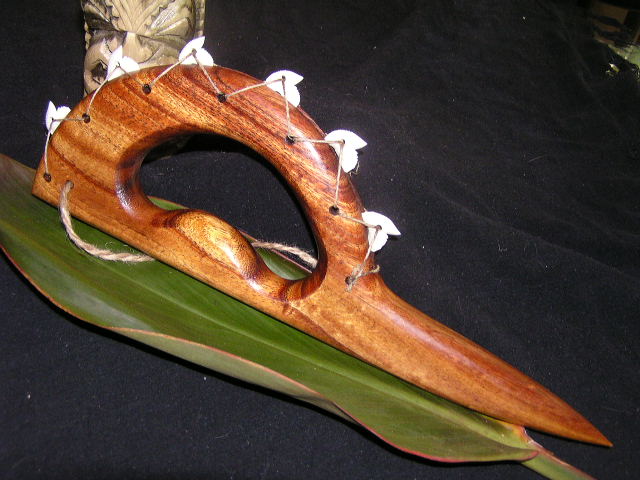
Koa wood knuckle duster with dagger
 Attachment: 77.22 KB Attachment: 77.22 KB
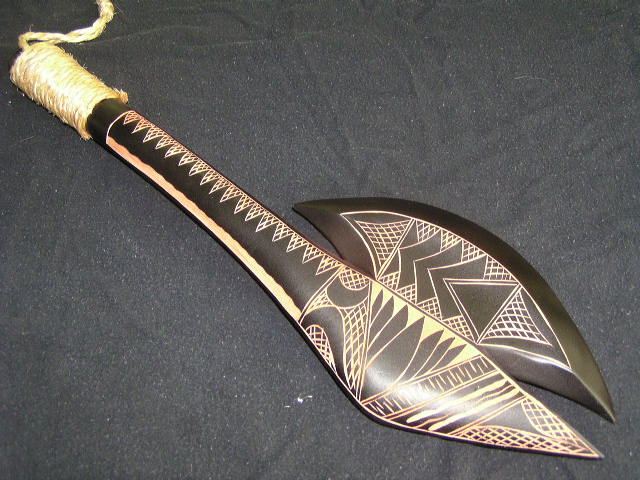
Samoan war axe
 Attachment: 79.16 KB Attachment: 79.16 KB
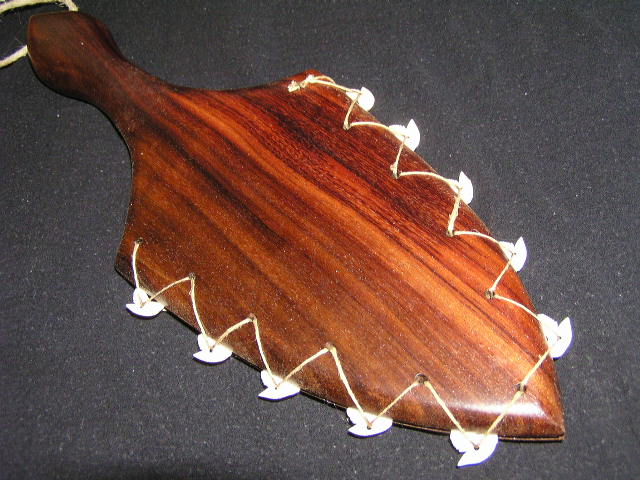
Hawaiian shark tooth club
|
|
   |
 |
|
Shane Allee
Industry Professional
Location: South Bend, IN Joined: 29 Aug 2003
Posts: 506
|
 Posted: Tue 20 Sep, 2005 4:03 pm Post subject: Posted: Tue 20 Sep, 2005 4:03 pm Post subject: |
 |
|
There really isn't much research out there on these that I know of yet, pictures are had to come by as well. Haven't been able to find out what kind of wood was used, thickness, cross section or anything really along those lines. Might not get to it this week since I'm preparing for an event, but next week I'll check in some more academic publications and see if anything turns up about them there.
I think there would be few alternatives that would really capture the look of the flaked obsidian. One option might be cut and polished obsidian though, I have a dagger done this way out of rainbow obsidian. You would still have to find someone with the ability to cutting and polishing work, so it might be just as easy getting one done right...?
Since you mentioned carvings, one of the drawings below has them but not much detail. Also went ahead and mentioned to Mark that they should get some of his wood carvings up on the site, so those are up there now if anyone wants to check them out. Jason from Albion has one of Mark's carvings that is really great, might be a few more floating around Albion or with some of those folks.


Some spears here...


I'll post more if/as I find it.
Shane
|
|
    |
 |
Gordon Frye

|
|
    |
 |
|
Russ Ellis
Industry Professional
|
 Posted: Tue 20 Sep, 2005 7:57 pm Post subject: Posted: Tue 20 Sep, 2005 7:57 pm Post subject: |
 |
|
I took these pictures back in June at the Blade show...
I don't recall the gentlemens name but he was very serious about his knapping of both obsidian and flint. Apparently had had made several trips to Sweden (if I recall correctly someplace in Scandinavia anyway) to examine archeological finds and you can see some examples of his own work here. He also is apparently responsible for most of the obsidian surgical instruments in the United States. I can't remember his name right off hand but I've got his card about someplace and if you are interested I'll try to dig it up. Unfortunately he said he does not have a web presence so he can only be contacted via telephone or mail. Check out that "dinosaur" dagger. Completely impractical but an incredible testament to his skill...
TRITONWORKS Custom Scabbards
|
|
  |
 |
|
|
You cannot post new topics in this forum
You cannot reply to topics in this forum
You cannot edit your posts in this forum
You cannot delete your posts in this forum
You cannot vote in polls in this forum
You cannot attach files in this forum
You can download files in this forum
|
All contents © Copyright 2003-2026 myArmoury.com — All rights reserved
Discussion forums powered by phpBB © The phpBB Group
Switch to the Basic Low-bandwidth Version of the forum
|

